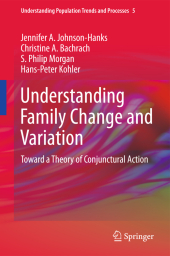 Neuerscheinungen 2013Stand: 2020-01-07 |
Schnellsuche
ISBN/Stichwort/Autor
|
Herderstraße 10
10625 Berlin
Tel.: 030 315 714 16
Fax 030 315 714 14
info@buchspektrum.de |

Christine A. Bachrach, Jennifer A. Johnson- Hanks, Lynette Hoelter, Jennifer A. Johnson-Hanks, Rosalind King, S. Philip Morgan, Pamela Smock
(Beteiligte)
Understanding Family Change and Variation
Toward a Theory of Conjunctural Action
Mitarbeit: Hoelter, Lynette; King, Rosalind; Smock, Pamela
2011. 2013. xx, 180 S. 4 Tabellen. 235 mm
Verlag/Jahr: SPRINGER NETHERLANDS; SPRINGER, BERLIN 2013
ISBN: 9400737009 (9400737009)
Neue ISBN: 978-9400737006 (9789400737006)
Preis und Lieferzeit: Bitte klicken
This book argues that social demography must be reintegrated into the core of theory and research on the processes and mechanisms of social action, and proposes a framework through which this reintegration can occur.
Fertility rates vary considerably across and within societies, and over time. Over the last three decades, social demographers have made remarkable progress in documenting these axes of variation, but theoretical models to explain family change and variation have lagged behind. At the same time, our sister disciplines-from cultural anthropology to social psychology to cognitive science and beyond-have made dramatic strides in understanding how social action works, and how bodies, brains, cultural contexts, and structural conditions are coordinated in that process. Understanding Family Change and Variation: Toward a Theory of Conjunctural Action argues that social demography must be reintegrated into the core of theory and research about the processes and mechanisms of social action, and proposes a framework through which that reintegration can occur. This framework posits that material and schematic structures profoundly shape the occurrence, frequency, and context of the vital events that constitute the object of social demography. Fertility and family behaviors are best understood as a function not just of individual traits, but of the structured contexts in which behavior occurs. This approach upends many assumptions in social demography, encouraging demographers to embrace the endogeneity of social life and to move beyond fruitless debates of structure versus culture, of agency versus structure, or of biology versus society.
Introduction.- Chapter 1: The Theory of Conjunctural Action.- Chapter 2: Consilience.- Chapter 3: Fertility Change and Variation: S. Philip Morgan and Hans-Peter Kohler.- Chapter 4: Social Class and the Timing and Context of Childbearing: Christine Bachrach, Pamela Smock, and Lynette Hoelter.- Chapter 5: A Conjunctural History of Assisted Reproductive Technologies: Jennifer Johnson-Hanks and Rosalind King.- Conclusion.


